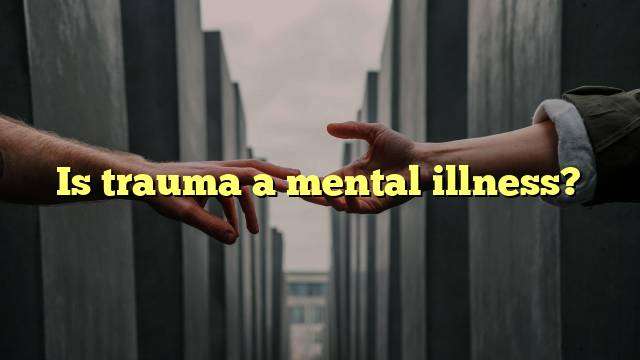What is Trauma?
Trauma is a psychological and emotional response to an event or an experience that is deeply distressing or disturbing. It may result from a single distressing experience or from several stressful events that occur over a period of time. Traumatic events can include physical, emotional, or sexual abuse, natural disasters, accidents, and war. When people experience a traumatic event, they may develop a range of physical, emotional, and behavioral reactions.
Is Trauma a Mental Illness?
The answer to this question is yes. Trauma is a mental illness, and it can have a significant effect on a person’s life. People who have experienced a traumatic event can develop symptoms that affect their ability to manage day-to-day tasks, interact with others, and cope with stress. These symptoms can include anxiety, depression, avoidance of certain situations, difficulty concentrating, nightmares, and intrusive thoughts.
Types of Trauma-Related Mental Illnesses
There are several different types of trauma-related mental illnesses, including post-traumatic stress disorder (PTSD), acute stress disorder (ASD), and complex post-traumatic stress disorder (C-PTSD).
Post-Traumatic Stress Disorder (PTSD)
Post-traumatic stress disorder (PTSD) is a mental health condition that can develop after a person experiences a traumatic event. Symptoms of PTSD can include flashbacks, nightmares, avoidance of situations that remind the person of the trauma, difficulty concentrating, and feeling on edge or jumpy.
Acute Stress Disorder (ASD)
Acute stress disorder (ASD) is a mental health condition that can develop shortly after a traumatic event. It is similar to PTSD but has a shorter duration. Symptoms of ASD can include intrusive memories, avoidance of situations that remind the person of the trauma, and difficulty concentrating.
Complex Post-Traumatic Stress Disorder (C-PTSD)
Complex post-traumatic stress disorder (C-PTSD) is a mental health condition that can develop after a person is exposed to multiple traumatic events over a period of time, such as in cases of domestic abuse or kidnapping. Symptoms of C-PTSD include intrusive memories, avoidance of situations that remind the person of the trauma, difficulty managing emotions, and feeling disconnected from others.
Treatment for Trauma-Related Mental Illnesses
The treatment for trauma-related mental illnesses depends on the individual and the type of trauma they have experienced. Some common treatments for trauma-related mental illnesses include:
- Cognitive Behavioral Therapy (CBT): This type of therapy helps people learn to manage their thoughts and behaviors in order to better cope with stress.
- Exposure Therapy: This type of therapy helps people confront their fears and learn to manage their reactions to them.
- Eye Movement Desensitization and Reprocessing (EMDR): This type of therapy helps people process and manage their traumatic memories.
- Medication: Certain medications, such as antidepressants and anti-anxiety medications, can help people manage their symptoms.
It is important to note that trauma-related mental illnesses can be difficult to treat and there is no one-size-fits-all approach. It is important to work with a mental health professional to find the best treatment plan for you.
Takeaway
Trauma is a mental illness that can have a significant effect on a person’s life. There are several different types of trauma-related mental illnesses, including post-traumatic stress disorder (PTSD), acute stress disorder (ASD), and complex post-traumatic stress disorder (C-PTSD). Treatment for trauma-related mental illnesses can include cognitive behavioral therapy (CBT), exposure therapy, eye movement desensitization and reprocessing (EMDR), and medication. It is important to work with a mental health professional to find the best treatment plan for you.


